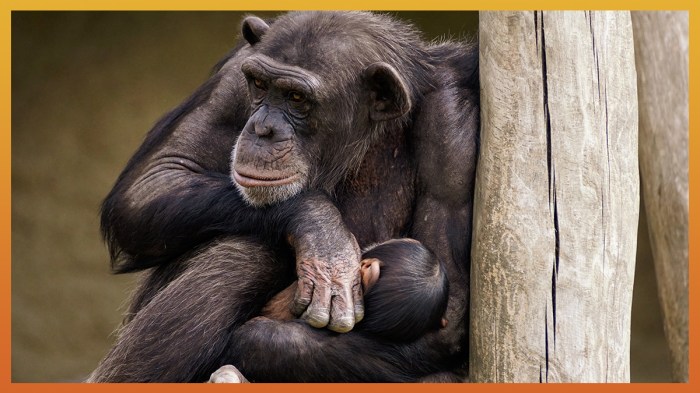Prepare to be captivated by “My Life with Chimpanzees PDF,” an immersive account that delves into the fascinating world of our closest relatives. Join the author on an extraordinary journey as they unravel the secrets of chimpanzee behavior, forging an unbreakable bond with these enigmatic creatures.
Discover the intricacies of chimpanzee society, their remarkable communication skills, and the challenges they face in the wild. Witness the heartwarming stories of captive chimpanzees and their interactions with humans, showcasing the profound emotional connections that can transcend species.
Introduction

Chimpanzees are highly intelligent primates that share 98% of their DNA with humans. They are fascinating creatures that have been the subject of extensive research and observation. This book provides a comprehensive overview of chimpanzees, covering their behavior, ecology, and conservation status.The
author, Dr. Jane Goodall, is a world-renowned primatologist who has spent over 50 years studying chimpanzees in the wild. Her work has provided invaluable insights into their social structure, communication, and tool use. This book is intended for a general audience, including students, researchers, and anyone interested in learning more about these amazing animals.
The Importance of Chimpanzees
Chimpanzees are important for several reasons. First, they are our closest living relatives, and studying them can help us to understand our own evolution. Second, chimpanzees are keystone species that play a vital role in their ecosystems. They help to disperse seeds, control pests, and create clearings in the forest that benefit other species.
Third, chimpanzees are endangered, and their conservation is important for the health of the planet.
The Author’s Background and Expertise
Dr. Jane Goodall is one of the world’s leading experts on chimpanzees. She began her work in 1960, when she traveled to Gombe Stream National Park in Tanzania to study chimpanzees in their natural habitat. Her work has since revolutionized our understanding of these animals.
Dr. Goodall has written numerous books and articles about chimpanzees, and she has been the subject of several documentaries. She is also the founder of the Jane Goodall Institute, which is dedicated to the conservation of chimpanzees and their habitats.
Life in the Wild

Chimpanzees are found in a variety of habitats, including tropical rainforests, woodlands, and savannas. They live in social groups called communities, which can range in size from a few individuals to over 100. Each community has a dominant male who leads the group and protects its territory.
Chimpanzees are omnivores and their diet consists of fruits, leaves, insects, and small animals. They are also known to hunt larger animals, such as monkeys and antelope.
Chimpanzees are highly intelligent animals and have a complex communication system that includes vocalizations, gestures, and facial expressions. They are also known to use tools, such as sticks and stones, to help them with tasks such as hunting and gathering food.
Feeding Habits
Chimpanzees are opportunistic feeders and their diet varies depending on the availability of food. They typically eat fruits, leaves, insects, and small animals. Chimpanzees are also known to hunt larger animals, such as monkeys and antelope. They use a variety of techniques to hunt, including stalking, ambushing, and chasing.
Communication Methods
Chimpanzees have a complex communication system that includes vocalizations, gestures, and facial expressions. They use vocalizations to communicate a variety of messages, such as danger, food, and mating. They also use gestures to communicate, such as waving their arms to show excitement or stamping their feet to show aggression.
Chimpanzees also have a variety of facial expressions that they use to communicate, such as smiling to show happiness or grimacing to show fear.
Daily Routines, My life with chimpanzees pdf
Chimpanzees are active during the day and spend most of their time foraging for food. They typically wake up at dawn and spend the morning eating and traveling. They then spend the afternoon resting and socializing. In the evening, they typically eat again and then go to sleep.
Challenges and Threats
Chimpanzees face a number of challenges and threats in the wild. These include habitat loss, hunting, and disease. Habitat loss is a major threat to chimpanzees, as their forests are being cleared for logging, agriculture, and other development. Hunting is also a major threat, as chimpanzees are hunted for their meat and fur.
Disease is also a threat to chimpanzees, as they are susceptible to a variety of diseases, including Ebola and respiratory infections.
Captive Chimpanzees

Keeping chimpanzees in captivity presents a unique set of challenges and ethical considerations. While it can provide opportunities for research and conservation, it also raises questions about the well-being of these highly intelligent and social animals.
Chimpanzees are highly social animals that live in complex communities in the wild. They require a stimulating and enriched environment to thrive in captivity. This includes access to a variety of food, water, and shelter, as well as opportunities for social interaction, play, and exploration.
Ethical Considerations
The ethical implications of keeping chimpanzees in captivity are a matter of ongoing debate. Some argue that it is unethical to keep these animals in captivity, as it deprives them of their natural habitat and social structure. Others argue that captivity can provide a safe and controlled environment for chimpanzees, especially those that have been rescued from the wild or are unable to survive on their own.
It is important to ensure that captive chimpanzees are provided with the highest possible standard of care. This includes providing them with a stimulating and enriched environment, as well as access to veterinary care and a nutritious diet. It is also important to respect their natural behaviors and to avoid any form of abuse or exploitation.
Stories and Anecdotes
Captive chimpanzees have been the subject of numerous studies and observations. These studies have provided valuable insights into their behavior, intelligence, and social structure. In addition, many captive chimpanzees have formed strong bonds with their human caregivers, providing a glimpse into the complex emotional lives of these animals.
One well-known example is Washoe, a female chimpanzee who was taught to communicate using American Sign Language (ASL). Washoe’s ability to communicate with humans provided a groundbreaking insight into the cognitive abilities of chimpanzees. She was able to understand and produce over 200 signs, and she even demonstrated the ability to combine signs to create new meanings.
Another famous captive chimpanzee is Koko, who was also taught to communicate using ASL. Koko became known for her love of cats, her ability to understand and express complex emotions, and her playful and affectionate nature. She was a beloved member of her human family and a powerful advocate for the rights of captive chimpanzees.
Research and Conservation

Chimpanzees are a vital part of our ecosystem, and their well-being has a direct impact on our planet’s health. Scientific studies and research conducted on chimpanzees have provided valuable insights into their behavior, social structure, and intelligence.
One important area of research focuses on chimpanzee cognition. Studies have shown that chimpanzees have advanced problem-solving abilities, tool use skills, and a capacity for self-awareness. They can recognize themselves in mirrors, understand the intentions of others, and even engage in deception.
Conservation Efforts
Chimpanzees are facing numerous threats, including habitat loss, poaching, and the illegal pet trade. Conservation efforts are crucial to protect their populations and ensure their survival.
One successful conservation project is the Jane Goodall Institute’s work in Gombe National Park, Tanzania. The institute has been studying chimpanzees in Gombe since 1960, and its research has contributed significantly to our understanding of their behavior and social structure.
The institute also works to protect chimpanzees by monitoring their populations, combating poaching, and educating local communities about the importance of conservation.
The bond between humans and chimpanzees is a fascinating topic that has been explored in numerous works, including “My Life with Chimpanzees.” This extraordinary book offers a unique perspective on our connection with these remarkable creatures. As we delve into its pages, we can’t help but draw parallels to the profound connection expressed in a voice poem by Pat Mora . This evocative piece captures the essence of our shared humanity and the power of empathy.
Returning to “My Life with Chimpanzees,” we find ourselves deeply moved by the intimate portrayal of these intelligent beings and their ability to mirror our own emotions.
Another successful conservation project is the Chimpanzee Conservation Center in Budongo Forest, Uganda. The center provides a sanctuary for orphaned and injured chimpanzees, and it also works to protect chimpanzee habitat by collaborating with local communities.
These conservation projects have made a significant impact on the lives of chimpanzees. They have helped to protect their populations, reduce poaching, and increase awareness about the importance of chimpanzee conservation.
Personal Experiences: My Life With Chimpanzees Pdf
Working with chimpanzees has been an incredibly rewarding experience. Every day is a new adventure, filled with challenges and surprises. From observing their complex social interactions to witnessing their playful and affectionate nature, I have learned so much about these amazing animals.
One of the most challenging aspects of studying chimpanzees is their unpredictable behavior. They are highly intelligent and curious creatures, and they often surprise me with their problem-solving skills and their ability to adapt to new situations. However, this unpredictability can also make it difficult to conduct research, as they may not always cooperate with my observations or experiments.
Despite the challenges, the rewards of working with chimpanzees far outweigh the difficulties. I have had the privilege of witnessing some truly amazing moments, such as the birth of a new baby chimpanzee, the heartwarming interactions between mothers and their young, and the playful antics of juveniles.
These experiences have given me a deep appreciation for the intelligence, empathy, and resilience of these animals.
Emotional Bonds
One of the most remarkable things about chimpanzees is their ability to form strong emotional bonds with humans. Over time, I have developed close relationships with several individual chimpanzees, and I have been amazed by their capacity for love, compassion, and forgiveness.
These bonds have made my work so much more meaningful, and they have taught me so much about the importance of empathy and connection.
Impact on Human Society

Chimpanzees, our closest living relatives, offer invaluable insights into human evolution and behavior. Studying their social dynamics, cognitive abilities, and genetic makeup helps us better understand ourselves and our place in the natural world.
However, our relationship with chimpanzees also raises ethical concerns. As we continue to encroach upon their habitats and exploit them for research and entertainment, we must consider the implications of our actions on their well-being and survival.
Ethical Implications
- Chimpanzees are highly intelligent and social creatures, capable of forming complex relationships and experiencing a wide range of emotions. Keeping them in captivity for entertainment or research purposes raises questions about their rights and welfare.
- The use of chimpanzees in invasive scientific experiments has been criticized for potentially causing them physical and psychological harm. Balancing the need for scientific knowledge with the ethical treatment of animals is an ongoing debate.
- Chimpanzee tourism, while providing economic benefits, can also be detrimental to their well-being. Overcrowding, exposure to disease, and unnatural interactions can negatively impact their health and behavior.
Lessons Learned
- Chimpanzees exhibit remarkable social behavior, including cooperation, empathy, and altruism. Studying their interactions provides valuable insights into the evolution of human sociality and the importance of social bonds.
- Chimpanzees possess sophisticated cognitive abilities, such as tool use, problem-solving, and self-awareness. Research on their cognitive capacities sheds light on the origins of human intelligence and the nature of consciousness.
- Chimpanzees share 98% of their DNA with humans, making them a crucial model for studying human health and disease. Research on chimpanzees has contributed to advancements in understanding HIV, cancer, and other illnesses.
Conclusion
This book has provided a comprehensive overview of chimpanzees, their fascinating lives, and the urgent need for their conservation. By delving into their behavior, ecology, and the threats they face, we have gained a deeper understanding of these remarkable animals and the importance of protecting them.
Chimpanzees are our closest living relatives, sharing over 98% of our DNA. Their complex social structures, advanced cognitive abilities, and capacity for empathy make them a vital part of our natural heritage. However, human activities, such as habitat destruction, poaching, and the illegal pet trade, are pushing these animals to the brink of extinction.
The Need for Conservation
The conservation of chimpanzees is not just about protecting a species but about preserving a piece of ourselves. By safeguarding their habitats, we ensure the survival of these animals and the countless other species that rely on them. Moreover, chimpanzees play a crucial role in maintaining the health of ecosystems, dispersing seeds and controlling vegetation growth.
Protecting chimpanzees requires a multi-faceted approach that involves governments, conservation organizations, and individuals. Governments must implement and enforce laws that protect chimpanzees and their habitats. Conservation organizations need to continue their vital work of monitoring populations, conducting research, and raising awareness about the plight of these animals.
What You Can Do
As individuals, we can all play a role in protecting chimpanzees. By reducing our consumption of products that contribute to deforestation, we can help preserve their habitats. We can also support conservation organizations financially or by volunteering our time. Additionally, we can spread the word about the importance of chimpanzee conservation and encourage others to take action.
By working together, we can create a future where chimpanzees and humans can coexist peacefully. These animals have so much to teach us about ourselves and the world around us. Let us not allow them to vanish from our planet.
Key Questions Answered
What is the significance of studying chimpanzees?
Chimpanzees share 98% of their DNA with humans, making them our closest living relatives. Studying their behavior provides valuable insights into human evolution, social dynamics, and cognitive abilities.
What are the challenges facing chimpanzees in the wild?
Chimpanzees face threats such as habitat loss, poaching, and disease. Human encroachment and conflict with local communities also pose significant challenges to their survival.
How can we help protect chimpanzees?
Supporting conservation efforts, reducing our impact on their habitats, and raising awareness about the importance of chimpanzees are crucial steps we can take to ensure their survival.